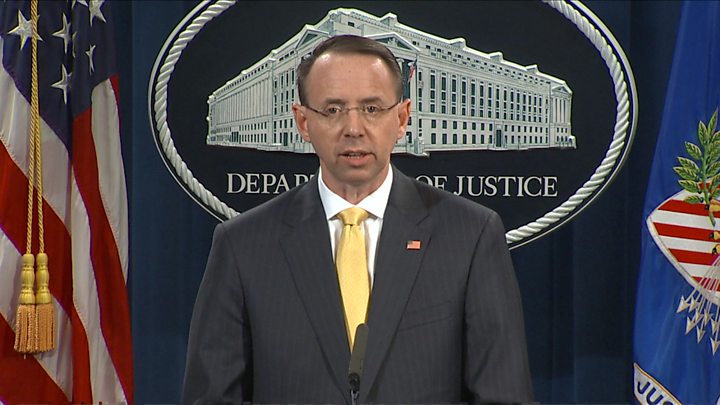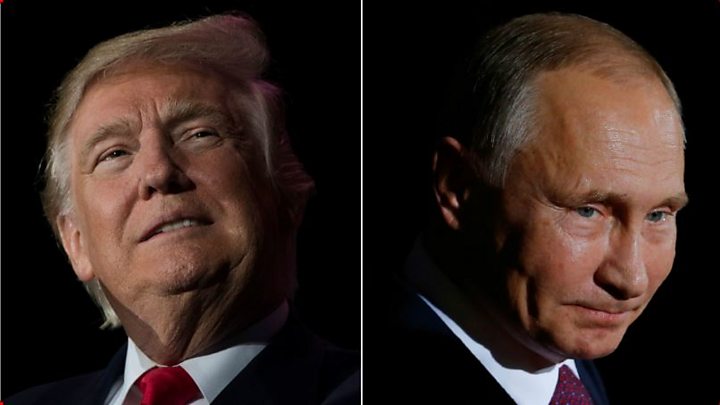Russia-Trump inquiry: Russian foreign minister dismisses FBI charges

Media playback is unsupported on your device
Russia's foreign minister has dismissed as "blather" the charges levelled by the FBI special counsel against 13 Russians for election meddling.
Sergei Lavrov said at a major security conference in Germany he would not comment further until he saw "facts".
The charges brought by Special Counsel Robert Mueller are seen as a major development in his continuing probe into the US 2016 election.
President Trump has said the indictment shows his campaign did "nothing wrong".
The Russian foreign minister was being questioned by participants at the Munich Security Conference.
Asked about the charges, he said that even Vice-President Mike Pence had called the investigation into question.
"So until we see the facts, everything else is just blather."
But Mr Trump's National Security Adviser, H R McMaster, said evidence of Russian meddling was "now incontrovertible".
It would become harder to conceal attempts to "interfere in our democratic process", he added.
In a tweet on Friday evening, Mr Trump repeated that there had been "no collusion" between his campaign and Russia.
However, he did appear to concede that Russia had sought to influence the election. The president has previously disputed US intelligence agency assessments suggesting this.
Skip Twitter post by @realDonaldTrump
Russia started their anti-US campaign in 2014, long before I announced that I would run for President. The results of the election were not impacted. The Trump campaign did nothing wrong – no collusion!
— Donald J. Trump (@realDonaldTrump) February 16, 2018
End of Twitter post by @realDonaldTrump
What does the indictment say?
Deputy Attorney General Rod Rosenstein said there was no allegation that any American was "a knowing participant in this illegal activity" nor was it alleged that the meddling altered the election outcome.
Three of the people named have also been accused of conspiracy to commit wire fraud and five have been accused of aggravated identity theft. Three companies have also been charged.
The 37-page indictment says a group of Russians:
- Posed as Americans, and opened financial accounts in their name; some visited the US
- Spent thousands of dollars a month buying political advertising
- Purchased US server space in an effort to hide their Russian affiliation
- Organised and promoted political rallies within the United States
- Posted political messages on social media accounts that impersonated real US citizens
- Promoted information that disparaged Hillary Clinton
- Received money from clients to post on US social media sites
- Created themed groups on social media on hot-button issues, particularly on Facebook and Instagram
- Operated with a monthly budget of as much as $1.25m (£890,000)
- Financed the building of a cage large enough to hold an actress portraying Hillary Clinton in a prison uniform
The indictment says those involved systematically monitored the success of their internet posts.

Media playback is unsupported on your device
"By 2016, defendants and their co-conspirators used their fictitious online persons to interfere with the 2016 US presidential election," the indictment continues.
"They engaged in operations primarily to communicate derogatory information about Hillary Clinton, to denigrate other candidates such as Ted Cruz and Marco Rubio, and to support Bernie Sanders and then-candidate Donald Trump."
One of the companies targeted is the Internet Research Agency, based in St Petersburg, which the indictment said "had a strategic goal to sow discord in the US political system, including the 2016 US presidential election".
Any reaction from those named?
One of the people named in the indictment – Yevgeny Prigozhin, who is known as "Putin's chef", denied election tampering.
"The Americans are very impressionable people, they see what they want to see…," he was quoted as saying by Russian news agency Ria Novosti on Friday. "I'm not at all upset that I'm on this list. If they want to see the devil, let them see him."
Mr Prigozhin has been a friend of Mr Putin since the 1990s. He has built up a business empire and has been accused of using companies to diffuse pro-Kremlin opinions via fake internet identities.
Heat is increasing
Analysis by Anthony Zurcher, BBC News, Washington
On Friday, Robert Mueller's team released a slate of indictments that lays bare what it asserts is the full shape of the Russian meddling apparatus.
And what an apparatus it was. In the run-up to the US presidential election "Project Lakhta", as it was called, had an operating budget of more than $1m a month.
The indictment does not suggest collusion between the Trump campaign and the Russians, however, and the White House may breathe a sigh of relief at this.
But the heat is increasing, and the investigation isn't over yet. At the very least, if Mr Mueller's allegations hold up in court, it will become increasingly difficult for the president to argue that Russian meddling on his behalf is an unsubstantiated hoax.
What do social media companies say?
Politicians from both major parties have responded with calls for social media to do more to prevent political interference via their platforms.
Facebook said in a statement that it had worked "proactively" with Mr Mueller's investigation, but had "more to do to prevent further attacks".
Twitter said the activities were "intolerable" and that it was working with investigators, but that tech companies could not defeat the new threat alone.
What is the investigation about?
US intelligence agencies believe Russia tried to sway the 2016 presidential election in favour of Mr Trump.
In May last year, Mr Mueller was appointed special counsel to investigate whether anyone from his campaign colluded in the effort.

Media playback is unsupported on your device
As part of the inquiry, former Trump campaign manager Paul Manafort has been charged with conspiring to defraud the US in his dealings with Ukraine, conspiracy to launder money and more recently with submitting false information to obtain a mortgage.
A business associate of Mr Manafort's, Rick Gates, was also charged with conspiracy to launder money. A third adviser to the Trump campaign, George Papadopoulos, pleaded guilty to lying to the FBI.
In December, Mr Trump's former national security adviser, Michael Flynn, pleaded guilty to making false statements about a meeting he had with the Russian ambassador in 2016.
This week President Trump's former chief strategist, Steve Bannon, was interviewed by Mr Mueller.
Mr Trump has been accused by opponents of trying to interfere with the investigation, which he denies.
[contf] [contfnew] 
BBC
[contfnewc] [contfnewc]



